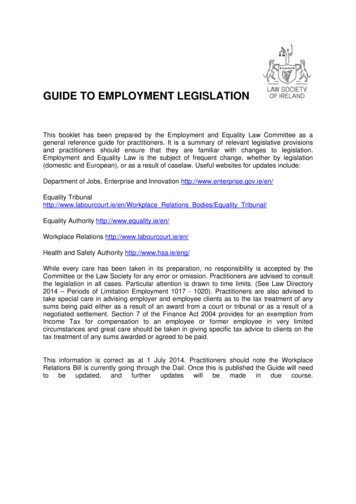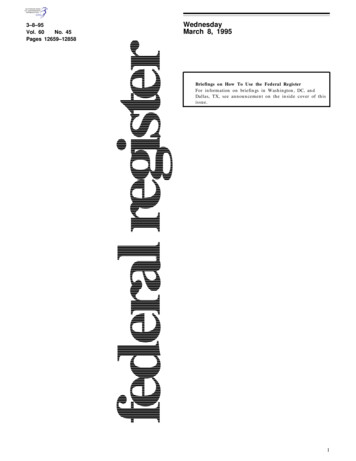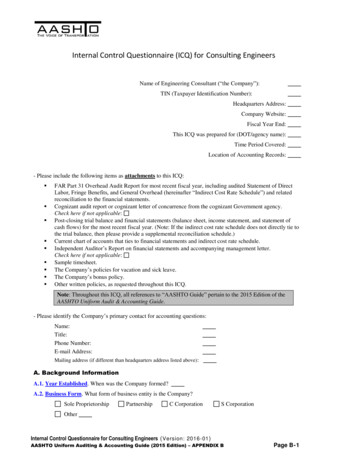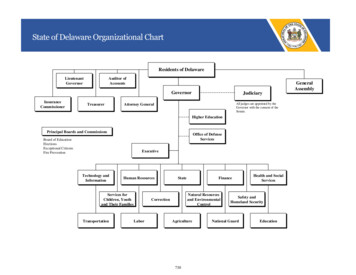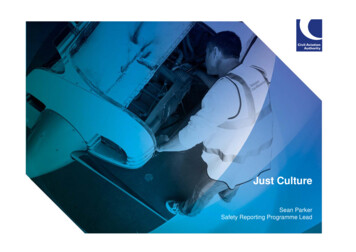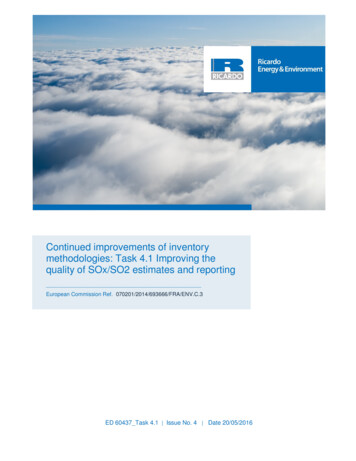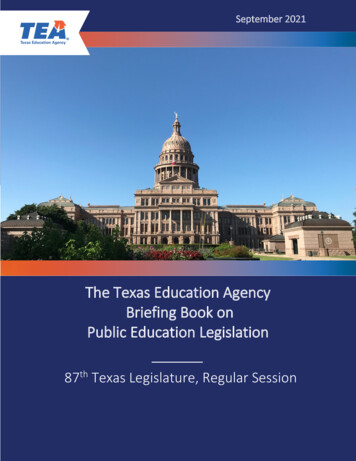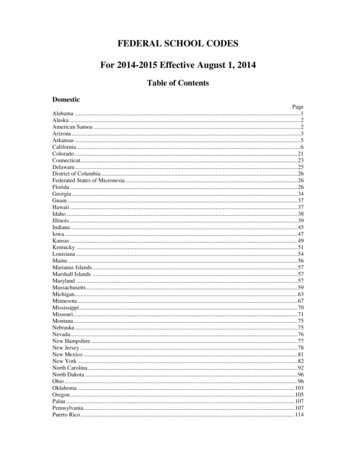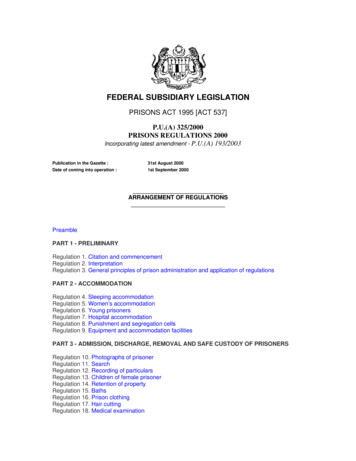
Transcription
FEDERAL SUBSIDIARY LEGISLATIONPRISONS ACT 1995 [ACT 537]P.U.(A) 325/2000PRISONS REGULATIONS 2000Incorporating latest amendment - P.U.(A) 193/2003Publication in the Gazette :31st August 2000Date of coming into operation :1st September 2000ARRANGEMENT OF REGULATIONSPreamblePART 1 - PRELIMINARYRegulation 1. Citation and commencementRegulation 2. InterpretationRegulation 3. General principles of prison administration and application of regulationsPART 2 - ACCOMMODATIONRegulation 4. Sleeping accommodationRegulation 5. Women's accommodationRegulation 6. Young prisonersRegulation 7. Hospital accommodationRegulation 8. Punishment and segregation cellsRegulation 9. Equipment and accommodation facilitiesPART 3 - ADMISSION, DISCHARGE, REMOVAL AND SAFE CUSTODY OF PRISONERSRegulation 10. Photographs of prisonerRegulation 11. SearchRegulation 12. Recording of particularsRegulation 13. Children of female prisonerRegulation 14. Retention of propertyRegulation 15. BathsRegulation 16. Prison clothingRegulation 17. Hair cuttingRegulation 18. Medical examination
Regulation 19. VaccinationRegulation 20. Contagious or infectious diseasesRegulation 21. Reception BoardRegulation 22. Information to prisonersRegulation 23. Custody during removal, etc.Regulation 24. Imprisonment for default or want of suretiesRegulation 25. Discharge on due dateRegulation 26. Police supervisionRegulation 27. Day of releaseRegulation 28. Discharge on holidaysRegulation 29. Return of clothing and propertyRegulation 30. Gratuity and special gratuityRegulation 31. Detention after due date of dischargeRegulation 32. Transport on dischargeRegulation 33. Computation of sentencesPART 4 - CATEGORISATION OF PRISONERSRegulation 34. Categories of prisonersPART 5 - THE PROGRESSIVE STAGE SYSTEMRegulation 35. StagesRegulation 36. First StageRegulation 37. Second StageRegulation 38. Third StageRegulation 39. Fourth StageRegulation 40. Special StageRegulation 41. Reduction and postponement of promotion in StageRegulation 42. PrivilegesPART 6 - THE REMISSION SYSTEMRegulation 43. RemissionRegulation 44. Consecutive and overlapping sentencesRegulation 45. Record of remissionRegulation 46. Explanation of Remission SystemRegulation 47. Remission for prisoners in mental hospitalRegulation 48. Remission during punishment, etc.Regulation 49. Forfeiture of award of remissionRegulation 50. Discharge when remission earnedRegulation 51. PunishmentRegulation 52. Release on part paymentRegulation 53. Restoration of remissionRegulation 54. Quadrennial report on prisonersPART 7 - TREATMENT OF PRISONERSRegulation 55. Duty of prison officersRegulation 56. Use of forceRegulation 57. BeddingRegulation 58. ClothingRegulation 59. CleanlinessRegulation 60. DietsRegulation 61. Diet of unconvicted prisonersRegulation 62. Diet scales to be exhibited
Regulation 63. Additional foodRegulation 64. Waste of foodRegulation 65. Inspection of foodstuffsRegulation 66. Restricted dietRegulation 67. ExerciseRegulation 68. Unauthorised articlesRegulation 69. Smoke, etc. prohibitedRegulation 70. Search of persons and vehiclesRegulation 71. Use of books and writing materials by prisonersPART 8 - EMPLOYMENT OF PRISONERSRegulation 72. General requirement of workRegulation 73. Hours of labourRegulation 74. Employment of women prisonersRegulation 75. Record of prisoners' workRegulation 76. Allocation of labourRegulation 77. Segregation of prisoner at labourRegulation 78. Labour on holidaysRegulation 79. Employment in special industryPART 9 - EARNINGS SCHEMERegulation 80. Payment for workRegulation 81. GradesRegulation 82. Grading and promotionRegulation 83. Rates of earningsRegulation 84. SavingsRegulation 85. Prisoners in hospitalPART 10 - LETTERS AND VISITS TO PRISONERSRegulation 86. Prisoners' communicationsRegulation 87. Normal minimum provision, on special letters and visitsRegulation 88. Postponement or withdrawal of letters or visits for misconductRegulation 89. Deferment in case of punishmentRegulation 90. Additional letters and visits as a privilegeRegulation 91. Letter instead of a visit, special letters and visitsRegulation 92. Communications through Officer-in-ChargeRegulation 93. Number of persons allowed to visitRegulation 94. Time and conditions of visitsRegulation 95. Visit on weekly holiday not allowedRegulation 96. Communication by ex-prisonersRegulation 97. Censoring of lettersRegulation 98. Supervision of visitsRegulation 99. Food from outsideRegulation 100. Particulars of visit or visits and powers of Officer-in-ChargeRegulation 101. Visits by legal adviserRegulation 101A. Written communication with legal advisers and courtsRegulation 102. Visits by police officerRegulation 103. Serving of writs, etc.Regulation 104. Letters and visits to debtorsRegulation 105. Letters and visits to unconvicted prisonersRegulation 106. Letters and visits to banishment prisonersRegulation 107. Letters and visits to prisoners under sentence of deathRegulation 108. Prisoners committed in default of payment of fine, etc.
Regulation 109. Sick prisonersRegulation 110. Visits for long sentence prisonersRegulation 111. Release of prisoners on licenceRegulation 112. Other forms of communicationPART 11 - PETITIONS AND COMPLAINTSRegulation 113. PetitionsRegulation 114. Petitions by condemned prisonersRegulation 115. Complaints by prisonersRegulation 116. Requests by prisoners to see Director General or Visiting JusticesRegulation 117. Applications by prisonersPART 12 - OFFENCES, PUNISHMENT AND RESTRAINTSRegulation 118. Officer-in-Charge to deal with reportsRegulation 119. Separation of reported prisonersRegulation 120. Information to reported prisonersRegulation 121. Offence against prison discipline to be reported and investigatedRegulation 122. Minor prison offencesRegulation 123. Aggravated prison offencesRegulation 124. Award of punishment by the Officer-in-Charge for minor prison offencesRegulation 125. Award of punishment by the Officer-in-Charge for aggravated prison offencesRegulation 126. Medical examination of prisoner awarded punishmentRegulation 127. Clothing and bedding for prisoners on punishmentRegulation 128. Full diet after 3 days restricted dietRegulation 129. Maximum period of close confinement in a yearRegulation 130. Visit to prisoner under close confinementRegulation 131. Corporal punishmentRegulation 132. Carrying out of punishmentRegulation 133. Rules for infliction of corporal punishmentRegulation 134. Remission of corporal punishmentRegulation 135. Record of corporal punishmentRegulation 136. Return of corporal punishmentRegulation 137. Record of punishmentRegulation 138. Prosecution in courtRegulation 139. Instruments of restraintRegulation 140. Temporary confinement in special cellPART 13 - ESCAPESRegulation 141. Security of ladders, planks, etc.Regulation 142. Action in the event of escapeRegulation 143. Escapees' special supervisionRegulation 144. Period of escape not to count as part of sentencePART 14 - RELIGIOUS INSTRUCTION AND EDUCATIONRegulation 145. Prisoner to state religious denominationRegulation 146. Change of religionRegulation 147. Religious educationRegulation 148. Religious services and instructionRegulation 149. Visits by religious personnel or other members of religious associationsRegulation 150. Religious books
PART 15 - EDUCATION AND GENERAL WELFARERegulation 151. Educational classesRegulation 152. LibraryRegulation 153. Reading materialsRegulation 154. Lectures and concerts, etc.Regulation 155. Physical training and recreationRegulation 156. Voluntary teachersPART 16 - APPELLANTSRegulation 157. AppellantsRegulation 158. Application by appellantsRegulation 159. Treatment of appellantsRegulation 160. Letters and facilities for appealRegulation 161. Custody of appellantsRegulation 162. Payment for work to appellantsRegulation 163. Period spent as appellant to count towards sentenceRegulation 164. Appellants subject to these RegulationsPART 17 - UNCONVICTED PRISONERSRegulation 165. Separation from convicted personsRegulation 166. EmploymentRegulation 167. Food and other necessitiesRegulation 168. Clothing and beddingRegulation 169. Prison dietsRegulation 170. Private medical adviserRegulation 171. VisitRegulation 172. Disinfection of clothingRegulation 173. Unconvicted prisoners to earn no remissionRegulation 174. Prisoners charged with a capital offenceRegulation 175. Forfeiture of privilegesPART 18 - PRISONERS UNDER SENTENCE OF DEATHRegulation 176. Search and accommodationRegulation 177. Visit by religious personnelRegulation 178. LettersRegulation 179. VisitsRegulation 180. Clothing, food, etc.Regulation 181. Employment and personal hygieneRegulation 182. ExecutionsPART 19 - BOARD OF VISITING JUSTICERegulation 183. Visit by Visiting JusticesRegulation 184. To be accompanied by prison officerRegulation 185. Complaints by prisonersRegulation 186. Inspection of prisonersRegulation 187. AbusesRegulation 188. Minute Book
PART 20 - AID ON DISCHARGE AND AFTER-CARE OF PRISONERSRegulation 189. ObjectiveRegulation 190. Constitution of Discharge BoardRegulation 191. Interview with prisonersRegulation 192. Special assistanceRegulation 193. EmploymentPART 21 - DUTIES OF THE DIRECTOR GENERAL, ETC.Division I - The Director GeneralRegulation 194. Inspection and report on prisonsRegulation 195. Regulations and uniformity to be enforcedRegulation 196. Duties on visitsRegulation 197. Director General's Standing OrdersDivision II - Officer-in-ChargeRegulation 198. Duties of Officer-in-ChargeRegulation 199. Administration of prisonRegulation 200. Control of officersRegulation 201. JournalRegulation 202. Maintenance of recordsRegulation 203. Inspection of prisonRegulation 204. Prisoners' complaints, etc.Regulation 205. Inspection of mealsRegulation 206. To ensure that Act, regulations and orders followedRegulation 207. Interview of prisoners on admissionRegulation 208. SearchRegulation 209. Muster of prisonersRegulation 210. Death of prisonerRegulation 211. Magistrate to be informedRegulation 212. Recommendations by Medical OfficerRegulation 213. Mentally disordered prisonersRegulation 214. Prisoners life endangered by imprisonmentRegulation 215. Visitors to view a prisonRegulation 216. Searching of prison officer, Medical Officer and othersRegulation 217. BooksRegulation 218. Inspection of buildings, machinery, etc.Regulation 219. Petitions by prisonersRegulation 220. Prisoners' propertyRegulation 221. Requisitions on storekeeperRegulation 222. Absence from prisonRegulation 223. Charge of the prison in the case of Officer-in-Charge's absenceRegulation 224. Reports to the Director GeneralRegulation 225. Action in case of emergencyRegulation 226. Reference to Director GeneralRegulation 227. Annual estimatesRegulation 228. Control of expenditureRegulation 229. Annual report on prisonDivision III - Medical OfficersRegulation 230. Resident Medical Officer and attendance at prisonRegulation 231. Examination of prisoners and visit to prisoners
Regulation 232. Case Book and JournalRegulation 233. Reports of mentally disordered prisonersRegulation 234. Sick prisonersRegulation 235. Prisoners unfit for prison, etc.Regulation 236. Inspection of prison, etc.Regulation 237. Death of a prisonerRegulation 238. Examination of food, water, clothing, etc.Regulation 239. Visits to prisoners on capital chargeRegulation 240. Report to be made on capital charge prisonersRegulation 241. Medical observation of prisonersRegulation 242. Infectious or contagious diseasesRegulation 243. Medical Officer to report certain mattersRegulation 244. To be conversant with regulationsDivision IV- Dental OfficersRegulation 245. Dental OfficersDivision V - Prison OfficersRegulation 246. EnlistmentRegulation 247. Liable to serve in any prisonRegulation 248. QuartersRegulation 249. Illness of officerRegulation 250. Absence from dutyRegulation 251. Search of prison officersRegulation 252. Obedience to laws, regulations, etc., and to ordersRegulation 253. Visitors to the prisonRegulation 254. Unauthorised communications to the pressRegulation 255. Unauthorised gratuities, fees, etc.Regulation 256. Interests in prison contracts forbiddenRegulation 257. Report of misconduct, etc.Regulation 258. Communications with relatives of prisonersRegulation 259. No testimonials to be given to prisonersRegulation 260. Trafficking with prisonersRegulation 261. Tobacco or liquorsRegulation 262. Junior prison officers not to punish prisonersRegulation 263. Not to enter prisoners' cells at nightRegulation 264. Conversing or familiarity with prisonersRegulation 265. Complaints or applications by prisonersRegulation 266. Safe custody of prisonersRegulation 267. Handing over dutiesRegulation 268. Rules regarding use of firearmsRegulation 269. Checking of keysRegulation 270. Not to leave prisonersRegulation 271. Visitors to the prisonRegulation 272. Prisoners who appear to be in ill-healthRegulation 273. Discipline dutyRegulation 274. Women prison officerPART 22 - DISCIPLINARY REGULATIONS AND DISCIPLINARY BOARDSRegulation 275. Application of P. U. (A) 395/93 and P. U. (A) 396/93
PART 23 - PRISON OFFICERS' REWARD FUNDRegulation 276. Administration and application of the FundRegulation 277. Accrued sumsRegulation 278. Management and operational costsRegulation 279. PaymentRegulation 280. Payment of reward not to exceed certain limits and to be publishedRegulation 281. Grant to welfare fund, recreation centre and clubRegulation 282. AccountsPART 24 - REVOCATIONRegulation 283. RevocationFIRST SCHEDULESECOND SCHEDULELIST OF AMENDMENTS
PreambleIn exercise of the powers conferred by section 67 of the Prison Act 1995 [Act 537], the Ministermakes the following regulations:PART 1 – PRELIMINARYRegulation 1. Citation and commencement.(1) These regulations may be cited as the Prisons Regulations 2000.(2) These Regulations shall come into operation on 1 September 2000.Regulation 2. Interpretation.In these Regulations, unless the context otherwise requires"long sentence prisoner" means a prisoner who is sentenced to imprisonment for a period of orexceeding six months or for consecutive periods the total of which amounts to or exceeds sixmonths;"short sentence prisoner" means a prisoner who is sentenced to imprisonment for a period of lessthan six months or for consecutive periods the total of which is less than six months;"unconvicted prisoner" means a person who is(a) confined under civil process;(b) on remand charged with a crime or an offence;(c) committed to take his trial;(d) confined for want of sureties; or(e) confined under section 4 of the Banishment Act 1959 [Act 79];"convicted prisoner" means a prisoner who is convicted by the court and has been sentenced toimprisonment;"weekly holiday" has the meaning assigned to it in the Holidays Act 1951 [Act 369];"gatekeeper" includes any junior or senior prison officer who is in charge of the main gate of aprison;"Earning Scheme" means a scheme of payment regulated in Part 9 of these Regulations
Regulation 3. General principles of prison administration and application ofRegulations.(1) These Regulations shall be applied, due allowance being made for the differences incharacter and respect for discipline of various types of prisoners, in accordance with the followingprinciples:(a) discipline and order shall be maintained with fairness but firmness and with no morerestriction than is required for safe custody and to ensure a well-ordered community life;(b) in the control of prisoners, prison officers shall seek to influence them through theirown example and leadership, and to enlist their willing co-operation; and(c) at all times the treatment of prisoners shall be such as to encourage their self-respectand a sense of personal responsibility, so as to rebuild their morale, to inculcate in themhabits of good citizenship and hard work, to encourage them to lead a good and usefullife on discharge and to fit them to do so.(2) These Regulations shall apply to every prisoner.(3) Notwithstanding subregulation (2), the provisions of any Part of these Regulations relating toany particular category of prisoners shall, where the provisions of such Part are in conflict or areinconsistent with any other provisions of these Regulations, apply to prisoners of such category.PART 2 – ACCOMMODATIONRegulation 4. Sleeping accommodation.(1) Every prisoner shall, if the accommodation of the prison permits, be confined at night in aseparate cell, dormitories or wards certified by the Medical Officer.(2) If it is necessary for special reasons, the Director General may authorise the accommodatingof not more than three prisoners in one cell.Regulation 5. Women's accommodation.(1) Male and female prisoners shall be kept absolutely separate from each other, and shall beconfined in different buildings.(2) The wards, cells, dormitories and yards where women prisoners are confined shall, if possible,be secured by locks different from those securing the wards, cell, dormitories and yards allottedto male prisoners.(3) Women prisoners shall in all cases be attended by women prison officers.(4) A male prison officer shall not enter a prison or part of a prison appropriated for the use ofwomen prisoners except on duty and in the company of a woman prison officer.
Regulation 6. Young prisoners.(1) Prisoners appearing to the Officer-in-Charge to be a young prisoner, whether male or female,shall be kept apart from adults.(2) A prisoner who declares himself to be more than twenty one years of age but who, in theopinion of the Officer-in-Charge and the Medical Officer, should not, having regard to hischaracter, constitution and antecedents, be classed with adult prisoners, shall be treated as ayoung prisoner.Regulation 7. Hospital accommodation.In every prison an infirmary or proper place for the reception of sick prisoners shall be provided.Regulation 8. Punishment and segregation cells.(1) In every prison, special cells shall be provided or appropriated for the confinement ofprisoners undergoing punishment for prison offences or segregated for the good order anddiscipline of a prison.(2) Every such cell shall be certified by the Medical Officer that it may be used as a punishmentcell or a segregation cell.Regulation 9. Equipment and accommodation facilities.The Officer-in-Charge may determine any equipment or facilities that may be placed in a cell ordormitory.PART 3 - ADMISSION, DISCHARGE, REMOVAL AND SAFE CUSTODY OF PRISONERS.Regulation 10. Photographs of prisoner.On admission, and from time to time as may be required, every prisoner shall be photographedand his or her name, age, height, weight, particular marks, general appearance and otherinformation, if any, shall be recorded in the Prisoner's Record.Regulation 11. Search.(1) Every prisoner shall be searched on admission and at such times subsequently as may bedirected, and all unauthorised articles shall be taken from him.
(2) The searching of a prisoner shall be conducted with due regard to decency and self-respect,and in as seemly a manner as is consistent with the necessity of discovering any concealedarticles.(3) No prisoner shall be stripped and searched in the presence of another prisoner.(4) No prisoner shall be searched except by a prison officer who is of the same gender as theprisoner to be searched.Regulation 12. Recording of particulars.On the admission into prison of a prisoner convicted of a registrable offence as defined by theRegistration of Criminals And Undesirable Persons Act 1969 [Act 7], or ordered to be banished, aphotograph and fingerprints of such prisoner shall be taken and a description made on the properforms and forwarded to the Registrar of Criminals.Regulation 13. Children of female prisoner.(1) A child under three years of age may be admitted with his mother by the Director General.(2) Any child admitted with his mother under this regulation may be provided with basicnecessities for the child's maintenance and care by the Director General.(3) When any child has presumably attained the age of three years, the Medical Officer shallreport if it is desirable or necessary that the child should be longer retained.(4) Except by special authority of the Director General, a child shall not be kept in prison with hismother after attaining the age of four years.(5) When a child attains the age of three or four, as the case may be, the Officer-in-Charge shallrefer to the Director General for instructions should the Officer-in-Charge know of no relationswilling or in a position to receive such child.Regulation 14. Retention of property.(1) Except in the case of persons detained for safe custody, the private clothes, money and allother articles in possession of, or sent in to any prisoner, not expressly allowed by theseRegulations, shall be taken from such prisoner.(2) Such property shall be inventoried in the Register of Prisoners' Effects, which shall be signedby the prisoner concerned certifying its correctness.(3) Any such article of a perishable or dangerous nature may be destroyed.Regulation 15. Baths.Every prisoner shall take a bath on admission, and thereafter daily unless the Medical Officerotherwise directs.
Regulation 16. Prison clothing.(1) Except for unconvicted prisoners, all prisoners shall be dressed in prison clothes.(2) All clothing shall be marked in accordance with the categorisation as specified in Part 4 ofthese Regulations or as directed by the Director General.Regulation 17. Hair cutting.(1) All convicted prisoners shall have their hair cut short and their beards, whiskers andmoustaches (if worn) trimmed close, and those who wear no hair on their faces, or a moustacheonly, shall be shaved as often as may be necessary to preserve a clean and decent appearance.(2) A woman prisoner's hair shall not be cut on admission or afterwards without her consentexcept where the Medical Officer or Officer-in-Charge, as the case may be, consider that this isnecessary for health, cleanliness or security reasons.(3) The hair of unconvicted prisoners shall be kept, as far as cleanliness permits, in the samestate as it was on admission.(4) Any Asian prisoners sentenced to imprisonment for any period exceeding one month, who arein the habit of shaving their heads, shall be allowed to have their heads shaved once a week.(5) The hair of a Sikh prisoner, shall not be cut without an order in writing from the Officer-inCharge, which order shall not be made except on the ground of necessity certified by a MedicalOfficer.Regulation 18. Medical examination(1) Every prisoner shall, as soon as possible after his admission, be separately examined by theMedical Officer, who shall enter in the Prisoner's Record particulars of the prisoner's state ofhealth and any other particulars as he may deem necessary.(2) No prisoner shall be sent to labour until the Medical Officer has certified that he is fit toperform such labour.(3) Every prisoner shall be examined by the Medical Officer before being discharged or removedto another prison.(4) The Medical Officer may, with the approval of the Officer-in-Charge, at any time arrange forany prisoner to undergo any medical test, as he may deem fit.(5) A prisoner due for discharge who is suffering from any acute or dangerous illness shall betransferred to a government hospital.
Regulation 19. VaccinationA prisoner may be vaccinated or re-vaccinated at the direction of the Medical Officer.Regulation 20. Contagious or infectious diseases.If any prisoner found to have any infectious or contagious disease, or to be infested with vermin,a report shall be made forthwith to the Medical Officer under whose direction steps shall be takento treat the condition and to prevent it from spreading to other prisoners.Regulation 21. Reception Board(1) At every prison there shall be a Reception Board consisting of the Officer-in-Charge and suchother persons as the Director General may determine, who shall, as soon as possible after thereception of the prisoner in the prison, interview every prisoner, and consider what arrangementsare to be made for his training.(2) The Reception Board shall, as soon as possible after reception, classify all prisonerssentenced to imprisonment, having regard to their age, character and previous history.Regulation 22. Information to prisoners.A printed abstract in English and Malay languages of these Regulations relating to the treatmentand conduct of the prisoners, with a copy of the prison dietaries shall be kept posted in placesaccessible to the prisoners and such regulations and dietaries shall be read to prisoners whocannot read within twenty-four hours after admission and once thereafter in every subsequentperiod of three months.Regulation 23. Custody during removal, etc.A prisoner who is being removed or transferred from one prison to another shall, while outside theprison, be kept in the custody of the prison officer directed to convey him and shall be deemed tobe in the lawful custody of the Officer-in-Charge of the prison at which such prison officer isserving.Regulation 24. Imprisonment for default or want of sureties.A prisoner committed to prison in default of paying a sum of money or for want of surety shall, onadmission be informed of the means whereby he may obtain his release but until he obtains hisrelease every such prisoner shall be subject to these Regulations
Regulation 25. Discharge on due date.The Officer-in-Charge shall be responsible especially for the due discharge of all prisonersimmediately on their becoming entitled to release, whether by the expiration of their terms ofsentences, payment of fines, pardons or commutations, or remissions of sentences earned underthese Regulations and, to ensure accuracy in regard to such remissions, he shall, at least onemonth before the date of release, check the remission earned by each prisoner.Regulation 26. Police supervision.The Officer-in-Charge shall one week before the discharge of any prisoner who has been directedto be subject to the supervision of the police for any period commencing from the expiration ofany sentence passed upon him notify the Registrar of Criminals of the day on which and the hourat which such discharge is expected to take place, and shall further ask such prisoner to whatplace he proposes to proceed on discharge and inform the Registrar of Criminals of the prisoner'sanswer to the question.Regulation 27. Day of release.A prisoner shall be released from prison in the morning of the day on which under theseRegulations he is due for release.Regulation 28. Discharge on holidays.If the date of a prisoner's release falls on a weekly holiday or a public holiday,the prisoner shallbe released on the preceding day.Regulation 29. Return of clothing and property.On the discharge of a prisoner, all articles of clothing and property shall be returned to him,unless it has been found necessary to destroy any article of clothing, in which case he shall beprovided with such clothing as is suitable.Regulation 30. Gratuity and special gratuity.(1) A gratuity in accordance with the Progressive Stage System shall be paid on release to everyprisoner sentenced to imprisonment (whether originally, or in default of payment of a fine or fines)for one month, but less than six months, and such a prisoner who spends the whole of such termin hospital shall be eligible for the gratuity.
(2) In addition to the gratuity referred to under subregulation (1) , a sum not exceeding twohundred ringgit may be awarded to a prisoner who has undergone a sentence of four years andabove and who has shown special zeal and skill, accompanied by exemplary conduct, in anybranch of prison industries.(3) Such sum shall only be granted with the approval of the Director General and on therecommendation of the Prison Discharge Board, and that it shall be applied to the purchase oftools and other equipment which will assist the rehabilitation of the prisoner.Regulation 31. Detention after due date of discharge.(1) Any punishment lawfully imposed on a prisoner in accordance with the provisions of the Actmay be carried into effect notwithstanding that the carrying into effect of the punishment maynecessitate the detention of the prisoner beyond the date at which he would otherwise be entitledto be discharged from prison.(2) The period of such detention shall not exceed forty-eight hours, such period to be calculatedfrom the last hour of the day upon which the prisoner would otherwise be entitled to bedischarged.Regulation 32. Transport on discharge.Subject to the approval of the Director General and at the expense of the Government, a prisonerduly discharged from a prison, including from a prison in a place other than that in which he wassentenced shall be provided with free transport back to his place where he ordinarily resides.Regulation 33. Computation of sentences.Sentences shall be computed as follows:(a) a term of imprisonment shall be deemed to run the first moment of the day on whichthe sentence begins;(b) a prisoner shall not be legally entitled to discharge until the end of the last day of hissentence and he may be detained until any hour on that day; and(c) a sentence expressed in terms of one month or more or one year or more shall run tothe date in the month or year in which it expires preceding the month or year on which itcommenced, whatever be the number of days in the month or months or year or years.
PART 4 - CATEGORISATION OF PRISONERSRegulation 34. Categories of prisoners.(1) With a view to facilitating the training of prisoners and of minimising the danger ofcontamination, prisoners shall be categorised, having regard to their age, gender, character,personality, previous history and other factors as may be determined by the Officer-in-Charge, inaccordance with the following provisions:(a) convicted category, which shall consist of all prisoners convicted and sentenced bythe court and currently serving sentence in prison;(b
Regulation 155. Physical training and recreation Regulation 156. Voluntary teachers PART 16 - APPELLANTS Regulation 157. Appellants Regulation 158. Application by appellants Regulation 159. Treatment of appellants Regulation 160. Letters and facilities for appeal Regulation 161. Custody of appellants Regulation 162. Payment for work to appellants
